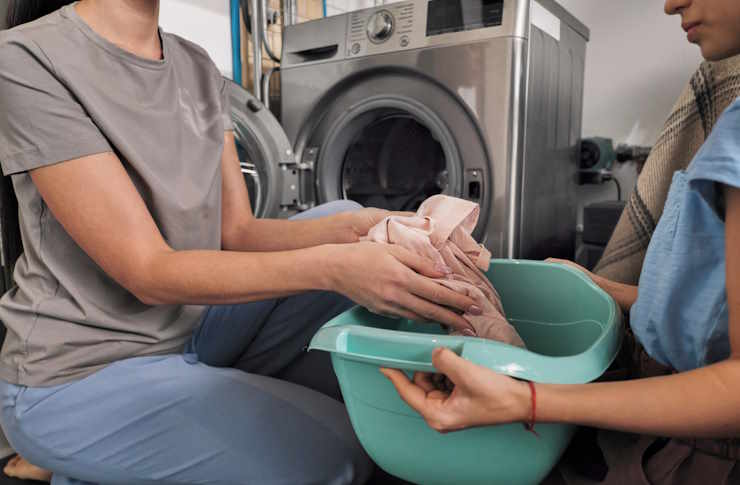Tips and Natural Hacks to Make Laundry Smell Fresh
Discover effective tips and natural hacks to ensure your laundry smells fresh and soothing every time. There’s nothing quite like the scent of freshly laundered clothes. Having laundry that smells good can enhance your mood and boost your confidence.

Achieving fresh-smelling laundry goes beyond simply tossing clothes in the washer with detergent. Many factors contribute to how your clothes smell after washing, including water temperature, drying methods, and the products you use. Understanding these elements and incorporating natural solutions can help you maintain that clean, pleasant scent in all your fabrics.
What Are the Best Natural Hacks to Make Laundry Smell Fresh?
Natural hacks to make laundry smell fresh often involve ingredients you already have at home. Baking soda is a powerful odor neutralizer that can be added directly to your wash cycle. Simply sprinkle half a cup into the drum before adding clothes. White vinegar works similarly, helping to break down detergent residue and eliminate musty smells. Add one cup to the fabric softener dispenser during the rinse cycle. Sunlight is another natural deodorizer. Hanging clothes outside to dry allows UV rays to naturally kill bacteria that cause odors. Even on cloudy days, fresh air circulation helps prevent that damp, stale smell that can develop in dryers. Freezing is an unconventional method for items that cannot be washed frequently, like jeans or delicate garments. Place them in a sealed bag in the freezer overnight to kill odor-causing bacteria without washing.
What Are the Most Effective Tips to Make Laundry Smell Fresh?
Beyond natural ingredients, proper washing techniques play a crucial role. Never leave wet laundry sitting in the washer, as this creates the perfect environment for mildew growth. Transfer clothes to the dryer or hanging rack immediately after the cycle completes. Clean your washing machine regularly by running an empty hot water cycle with two cups of white vinegar monthly. This removes buildup and prevents odors from transferring to your clothes. Avoid overloading the washer, which prevents proper cleaning and rinsing. Clothes need room to move freely for detergent to work effectively. Use the appropriate amount of detergent. Too much creates residue that traps odors, while too little fails to clean properly. Check your detergent label for dosage recommendations based on load size and water hardness. Sort laundry by fabric type and soil level. Washing heavily soiled items separately prevents odors from spreading to lightly worn clothes.
How Can Essential Oils for Laundry Detergent Enhance Freshness?
Essential oils for laundry detergent offer a natural way to add pleasant scents while providing antimicrobial benefits. Lavender oil is popular for its calming scent and bacteria-fighting properties. Add 5-10 drops to wool dryer balls or directly to the wash cycle. Tea tree oil has strong antifungal and antibacterial qualities, making it excellent for towels and workout clothes. Lemon oil provides a fresh, clean scent while helping to brighten whites naturally. Eucalyptus oil works well for bedding and can help with respiratory benefits. Peppermint oil offers an invigorating scent and helps repel insects in stored linens. To use essential oils effectively, mix them with a carrier like unscented liquid detergent or add them to homemade dryer sheets made from cloth scraps. Avoid applying oils directly to clothing, as they can stain. Instead, add them to dryer balls, which distribute the scent evenly throughout the load. You can also create a linen spray by mixing 10-15 drops of essential oil with water in a spray bottle for a quick refresh between washes.
What Is the Secret to Great Smelling Laundry?
The secret to great smelling laundry lies in combining multiple strategies rather than relying on a single solution. Start with a clean washing machine, as residue and mildew in the machine will transfer to your clothes regardless of what products you use. Use hot water when appropriate for fabrics, as heat helps activate detergent and kill odor-causing bacteria. However, always check care labels first. Pre-treat stains and heavily soiled areas before washing to prevent odors from setting in. A paste of baking soda and water works well for this purpose. Ensure clothes are completely dry before storing them. Even slightly damp fabrics will develop musty odors in closets and drawers. Add scented sachets to drawers and closets to maintain freshness between wears. These can be made with dried lavender, cedar chips, or other naturally fragrant materials. Consider the humidity in your laundry area. High humidity prevents proper drying and encourages mildew growth. Use a dehumidifier if necessary, especially in basement laundry rooms.
How Do You Choose Products for the Best Smelling Laundry Detergent?
When selecting products for the best smelling laundry detergent, consider both scent preferences and fabric care needs. Plant-based detergents often use essential oils for fragrance rather than synthetic perfumes, providing a more natural scent that is gentler on sensitive skin. Concentrated formulas typically offer stronger, longer-lasting scents because they contain less water and more active ingredients. Look for detergents labeled as high-efficiency if you have an HE washer, as these produce fewer suds and rinse more completely, preventing residue buildup that can trap odors. Scent boosters are separate products designed to enhance fragrance, but many contain synthetic chemicals. Natural alternatives include adding a few drops of essential oil to wool dryer balls or using homemade scent sachets in the dryer. Fabric softeners can help clothes smell fresh, but liquid versions may leave residue. Dryer sheets are convenient but often contain synthetic fragrances. Wool dryer balls with essential oils provide a reusable, natural alternative. Read ingredient lists carefully if you have allergies or sensitivities. Terms like fragrance or parfum can indicate dozens of undisclosed chemicals. Opt for products that list specific essential oils or natural fragrances when possible.
Conclusion
Achieving fresh-smelling laundry involves a combination of proper washing techniques, natural ingredients, and quality products. By incorporating methods like using baking soda and vinegar, adding essential oils, maintaining your washing machine, and ensuring clothes dry completely, you can enjoy naturally fresh laundry without relying heavily on synthetic fragrances. Small changes in your routine, such as not overloading the washer and promptly removing clothes after washing, make a significant difference. Whether you prefer store-bought detergents or homemade solutions, understanding the factors that contribute to laundry freshness empowers you to customize your approach based on your needs and preferences.




